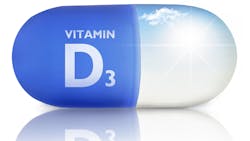Vitamin D deficiency and COVID-19
Vitamin D in its inactive form (vitamin D3 or cholecalciferol) is a steroid hormone that is synthesized in the skin with adequate exposure to the sun (ultraviolet light) and/or acquired through diet. Vitamin D is vital for the health of the brain, cardiovascular system, respiratory tract, skin, and the immune and endocrine systems. Vitamin D plays an important role in the promotion of the immune response to microbial and viral infections. The antimicrobial protein synthesis by immune and epithelial cells as well as nonspecific immune responses are activated by vitamin D.2 Vitamin D also takes part in the specific immune response and suppresses the destructive effects of bacterial and viral invasion. A key player in bone growth and metabolism, vitamin D promotes the intestinal absorption of calcium and phosphorous. Vitamin D insufficiency and deficiency are estimated to have a prevalence as high as 50%–75% in the United States alone and is especially relevant now that we have entered the winter months.
Although the study did not find any direct relationship between vitamin D concentrations/deficiency and disease severity, coauthor José L. Hernández, PhD, of the University of Cantabria in Santander, Spain, suggests, “One approach is to identify and treat vitamin D deficiency, especially in high-risk individuals such as the elderly, patients with comorbidities, and nursing home residents, who are the main target population for the COVID-19. Vitamin D treatment should be recommended in COVID-19 patients with low levels of vitamin D circulating in the blood since this approach might have beneficial effects in both the musculoskeletal and the immune system.”
How can dental providers help?
When treating patients who lack vitamin D, the first step for dental care providers is to diagnose the patient as deficient, insufficient, or normal. According to the 2011 vitamin D dietary intake recommendations from the National Academy of Medicine, 600–800 IU intake of vitamin D would meet the nutritional needs for the majority of the population. In the past, some practitioners had advocated for the upper limits of 4,000–10,000 IU per day for individuals deficient in vitamin D; however, some studies suggest that once a certain level of vitamin D has been reached, taking excess doses has either no or harmful effects. Treatment should be customized for patients with specific serum testing and coordinated with their medical doctor.
Editor’s note: This article originally appeared in Perio-Implant Advisory, a newsletter for dentists and hygienists that focuses on periodontal- and implant-related issues. Perio-Implant Advisory is part of the Dental Economics and DentistryIQ network. To read more articles, visit perioimplantadvisory.com and subscribe at this link.
References
- Hernández JL, Nan D, Fernandez-Ayala M, et al. Vitamin D status in hospitalized patients with SARS-CoV-2 infection. J Clin Endocrinol Metab. October 27, 2020. https://academic.oup.com/jcem/advance-article/doi/10.1210/clinem/dgaa733/5934827
- Schwalfenberg GK. A review of the critical role of vitamin D in the functioning of the immune system and the clinical implications of vitamin D deficiency. Mol Nutr Food Res. 2011;55(1):96-108. doi:10.1002/mnfr.201000174
Related reading:
About the Author

Scott Froum, DDS
Editorial Director
Scott Froum, DDS, a graduate of the State University of New York, Stony Brook School of Dental Medicine, is a periodontist in private practice at 1110 2nd Avenue, Suite 305, New York City, New York. He is the editorial director of Perio-Implant Advisory and serves on the editorial advisory board of Dental Economics. Dr. Froum, a diplomate of both the American Academy of Periodontology and the American Academy of Osseointegration, is in the fellowship program at the American Academy of Anti-aging Medicine, and is a volunteer professor in the postgraduate periodontal program at SUNY Stony Brook School of Dental Medicine. He is a trained naturopath and is the scientific director of Meraki Integrative Functional Wellness Center. Contact him through his website at drscottfroum.com or (212) 751-8530.

